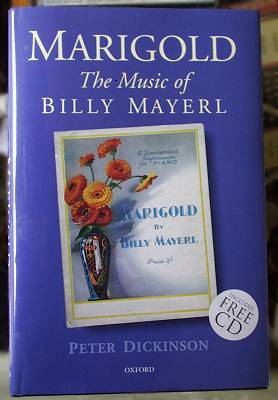|
Separating fact from fiction

MIKE HARTH reads Peter Dickinson's book
Marigold: The Music of Billy Mayerl
 In spite of considerable efforts, Peter Dickinson has not been
able to trace Mayerl's ancestry on his father's side, though it seems likely
to have been Czech. His mother was of Dutch extraction, so Billy Mayerl
had not a drop of English blood in his veins. It is therefore surprising
that so much of his music seems quintessentially English. In spite of considerable efforts, Peter Dickinson has not been
able to trace Mayerl's ancestry on his father's side, though it seems likely
to have been Czech. His mother was of Dutch extraction, so Billy Mayerl
had not a drop of English blood in his veins. It is therefore surprising
that so much of his music seems quintessentially English.
The biographical side of Billy's life is well enough documented and attempts
made to clear some of the confusion. Well known are the circumstances of
that first meeting with Bert Ralton, which led to the real beginnings of
Mayerl's career. It is likely that he tinkered with the facts in the interests
of a good story or good publicity, or both. Dickinson does a valiant job
of separating fact from fiction to provide somewhere near the truth.
Jill Mayerl too, it seems, embellished her accounts. We also learn from
Peter Dickinson that the Billy Mayerl School was not bombed during the war.
No doubt Jill wished to hide the somewhat ignominious end of the School.
The author has examined the pieces that have opus numbers and calculated
their dates of composition. This exercise, with study of the stylistic features,
enables Dickinson to trace stylistic development, which broadly fits the
numerical series.
Discussion of Mayerl's early music is amongst the most valuable aspects
of this book. The two early sets, Pianolettes and Piano Exaggerations
are indebted to Confrey but Dickinson proves that they eclipsed his music.
Much of Mayerl's music is here discussed, although I must say that I find
Harmonica Dance more than just clever, and that Clockwork
merits more than description as another helter-skelter.
Leslie Osborn, Billy's associate for many years said, 'I don't think
Bill had got it, because if he had he'd have hit the jackpot at least ONCE.
But Bill never wrote a hit song'. Even more over the top: Van Phillips,
when asked by Professor Dickinson in 1982 his view of the demise of Mayerl's
songs said, 'I'm surprised you even ask. Of course Billy's songs are not
memorable. As a matter of fact, Marigold has got the most feeble
melody you ever thought of '.
He was not a natural songwriter in the sense that Gershwin and Jerome
Kern were, or even Noel Coward and Ivor Novello.
Billy left an outstanding collection of over one hundred original piano
and orchestral pieces, about a hundred songs used in successful West End
shows and films, plus about 120 brilliant transcriptions of popular songs
of the period. They continue to be played - often when the original song
is forgotten. Peter Dickinson's chapter on the piano transcriptions is much
to be welcomed. His discussion of Mayerl's output of original pieces is
thorough and several of them are dealt with in detail.
There is so much more to this study of Billy Mayerl. For an enthusiast
it is an essential companion, especially with the enclosed CD containing
29 of Mayerl's performances. We are greatly indebted to Peter Dickinson
for his labour and the result.
Copyright © 27 April 2000 Mike Harth,
UK
 << Music
& Vision home
More book reviews >>
<< Music
& Vision home
More book reviews >>
|